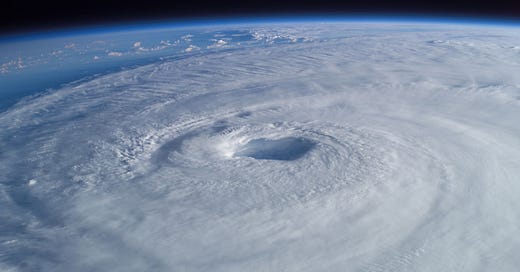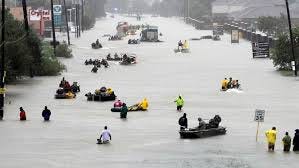'Protect Us From Hurricanes!'
Hurricanes are nasty creatures. They kill people and destroy massive volumes of property, all without remorse. The top spot for the most costly hurricane in U.S. history is a tie between Katrina in 2005 and Harvey in 2017, at about $125 billion each. And that's just dollars of property damage; deaths and injury have their own dishonorable-mention stats. As of this writing, damage dollars are still being tabulated for Hurricane Ian’s destruction thru Florida and the Carolinas.
By golly, the government needs to protect us from these monsters! FEMA has promised to “unleash a massive amount of disaster aid” for Ian victims. Feds vow major aid for Hurricane Ian (and while they're at it, let's also pay for earthquakes, firestorms, tornados, landslides, and other acts courtesy of Mother Nature).
To protect us from hurricanes in my home state of Texas, the Army Corp of Engineers is considering a huge storm surge protection system across the mouth of Galveston Bay. It is tagged the "Ike Dike", named after Hurricane Ike, which tore right up the Houston Ship Channel in 2008. The dike’s estimated cost is $28 to $31 Billion. All paid by taxpayers, of course (the potential environmental damage of the project is a separate topic.)
Is hurricane protection a job for government?
Let's begin by mentioning that elephant here in our living room: the U.S. government already spends a helluva lot of money. The federal budget for fiscal year 2022 is like $5.3 trillion, which divides out to about $16 thousand for every man, woman, and child in the USA (and rising, with no end in sight.) And that’s just federal spending; state and local governments pile it on top of that. It seems that everybody and his brother have lots of really good reasons for government to spend more money, but nobody can ever think of a reason for government to spend less money.
The core of the argument for governmental protection from Mother Nature is the age-old wealth redistribution theme straight from Karl Marx: from each according to his ability, to each according to his needs. People who have endured a hurricane are in need, and others have the ability. And so government must take from one to give to the other - minus the government's hefty transaction handling charges, of course.
One of the biggest problems with this philosophy is that it incentivizes victimhood. Everybody is potentially a victim of something - if not a hurricane, then a blizzard, bad health, loss of job, financial hardships, ethnic prejudice, lack of self-esteem, obesity, addiction - the list is endless. You end up with a system whereby those who are good at invoking pity get the money. Meanwhile, those who pick themselves up, wipe off the dust, and get back in the game must cough up the tax dollars for the poor-poor-pitiful-me crowd. Is this any way to build a productive, successful society?
The pro-government crowd will, of course, retort with something like: “But this is an emergency! People are suffering! Now is not the time to get political!” Um... it got “political” long, long ago when somebody decided that government must subsidize disasters. Now you have a system where the state thrives on emergencies. A “Disaster Declaration” yields a windfall of money to the affected area. Never let a crisis go to waste!
So if government is not the ultimate savior of hurricane victims, then who is? The answer, in short, is: you are.
First, take a lesson from the fable of the Three Little Pigs, and build your structures soundly (recap: the wise pig built his house with bricks, rather than with sticks or straw.) Even the Bible implores good construction decisions: build your house on rock, not on sand (Mathew 7:24). If you live in a hurricane-prone area, then harden your buildings against the wind, and build them high enough to survive a flood. Or better yet: stay out of flood zones in the first place. Don’t build a house on a barrier island, for gosh sakes! And buy adequate insurance. It's up to you - not the government - to cover your assets.
Meanwhile, there are all sorts of ways you can help that do not involve government. After Hurricane Harvey, pro football defensive lineman J.J. Watt created his own foundation to help the victims. Anyone can donate, any amount, any time. You can help Hurricane Ian victims right here:
Donate to Emergency Disaster Services
And let us not forget groups like the Cajun Navy. In the aftermath of Hurricane Harvey, this group from Louisiana volunteered their time, their energy, their boats, and their resources, at a tremendous risk to themselves and their watercraft, to rescue complete strangers.
Furthermore, it is foolish for the people of Florida to demand that the federal government collect tax dollars from other, unaffected states to pay for their hurricane. Or to pay for an Ike Dike in Texas. If government absolutely must have special-interest programs for some needy group, then localize and decentralize it as much as possible. State-wide government is better than national government. County government is even better than state-wide. City is better than county. Neighborhood is even better than city-wide. The more decentralized and localized the government, then the greater the relative weight of your vote. And it's much easier to pack up and “vote with your feet” if local government policy is not to your liking.
Finally, remember that politicians and bureaucrats don't give a flying flip about the poor and suffering victims of the latest disaster. Despite the rhetoric, it has nothing do with compassion. Rather, it's all about power - the power to buy votes with my paycheck, and yours.









